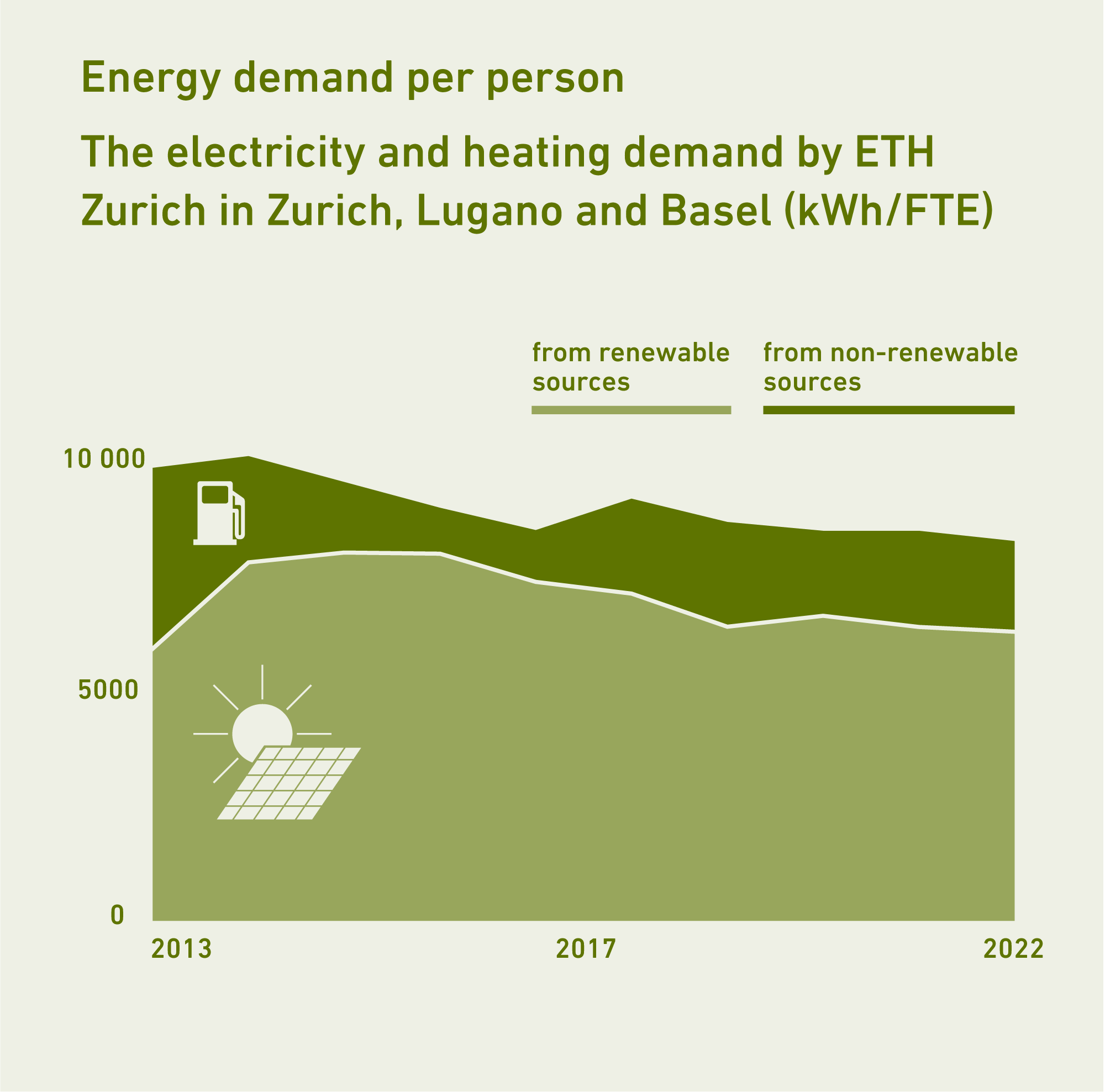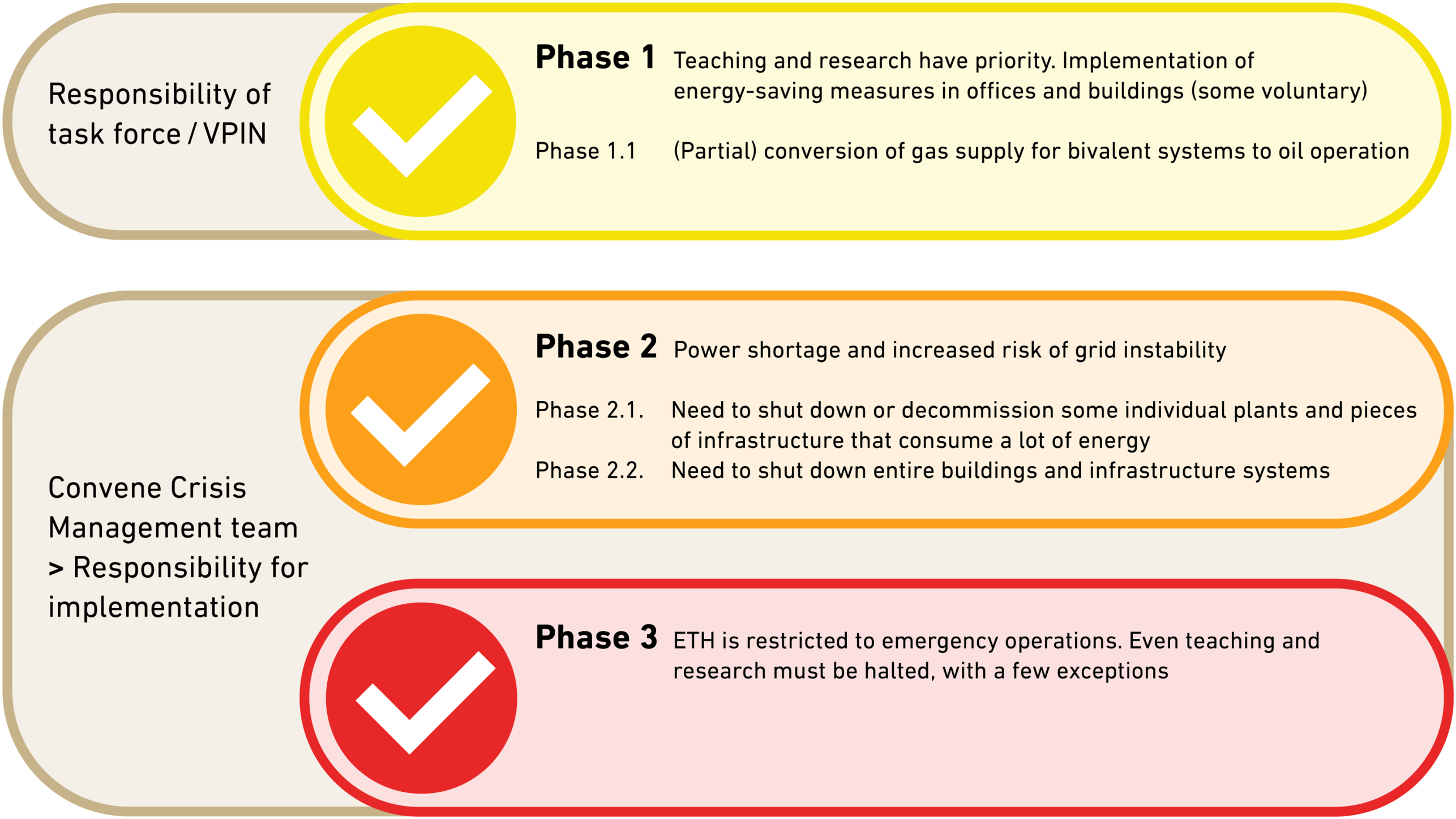Saving energy and costs - energy supplies during gas and electricity shortages
ETH Zurich’s energy-saving measures pursue the goal of reducing energy consumption in order to curb the rise in energy costs. Another goal is to help prevent any possible shortages. Further savings will also help ETH meet its sustainability goals.

Since October 2022, ETH Zurich has implemented hundreds of individual energy-saving measures. These have generally proved effective and have been adopted as the new standard or reactivated for the current heating period. Over the winter of 2022/23, the university cut its energy consumption by around 7 percent and met the Swiss federal government’s gas-savings target. It has also set itself the goal of slowing the growth in electricity consumption and reducing gas consumption for winter 2023/2024.
All energy-saving measures have been designed and implemented so as to ensure minimal impact on face-to-face teaching and on research. In the event of shortages, or should the Federal Council impose rationing, teaching and research activities will be given priority.
That is why the university’s energy-saving measures focus first on reducing energy consumption in offices and buildings. However, teaching and research are also doing their part and are continuously working with the energy shortage task force to examine possible energy-saving measures for the departments.
What energy-saving measures will ETH Zurich implement in 2023/24?
On 1 October 2023, ETH Zurich started to reduce its gas and energy consumption. For the time being, the measures focus on two main areas:
- Heating temperature: The heating temperature will generally be reduced to a minimum for the 2023/24 heating period – the room temperature in the buildings is therefore 20 degrees Celsius. In unused rooms, the heating will be lowered even further or turned off completely.
- Lighting: All non-safety-related lighting will be reduced to the necessary minimum. This applies to both indoor and outdoor lighting. Lighting will be reduced and fixtures switched off primarily in places like hallways and corridors where they are used only from time to time, but not in offices or anywhere they are in use almost continuously. Display cases will also be switched off.
In contrast to the winter of 2022/23, there will be no restrictions to the hot-water supply unless otherwise announced. Should the situation worsen, the energy shortage task force reserves the right to implement further cost-cutting measures.
The energy-saving measures are based on a comprehensive inventory of the facilities and buildings and are being implemented step by step. In this way, measures can be adapted as the winter progresses to meet the specific requirements of facilities, buildings and users and to achieve the greatest effect.
Energy Saving Alliance
ETH Zurich is a member of the Energy Saving Alliance, which brings together nearly 500 organisations that voluntarily take energy-saving measures in order to use energy more efficiently and economically and to contribute to the security of supply in winter.
Energy-saving target for 2023
Another reason ETH Zurich wants to reduce energy consumption is to curb the price-driven rise in energy costs. The university has set itself the target of saving around 1.8 million Swiss francs in electricity costs in 2023. To achieve this, ETH must reduce its consumption by 6 percent, or around 7.2 gigawatt hours (GWh). This equals the annual electricity consumption of around 1,800 four-person households. All members of the ETH community are requested to help reduce electricity consumption.
Details on ETH Zurich's energy saving target can be found in the following news item.
How can I help to save energy?
All members of the ETH community can help to reduce energy consumption by voluntarily adopting energy-saving measures.
- Savings tips: Practical tips and recommendations on how each and every individual can reduce their energy consumption are available from the federal government’s external page Don’t Waste campaign.
The main measures include:
- Limit room temperatures to a maximum of 20 degrees Celsius: A reduction of 1 degree saves around 6 percent heating energy.
- Open windows completely for a brief time instead of keeping them tilted open: Specifically, open windows wide 3 to 5 times a day for 5 to 10 minutes.
- Turn off equipment that is not in use: Turn off any devices and appliances that you’re not using in your office or lab.
- Do without standby: Turn off the devices you don’t currently need instead of leaving them running in standby mode.
- Do not use electric heaters: Members of the ETH community are not permitted to use private heaters (fan heaters, bar heaters and the like) in rooms at ETH Zurich to raise the room temperature locally. These have always been prohibited.
- Take the stairs instead of using the lift: Consume calories instead of electricity.
Do you have questions about energy supply and how to save energy?
Do you have any suggestions or ideas for improvement on how ETH can save even more energy? Members of the ETH community can send their questions or concerns about energy-saving measures or energy supply to the following e-mail address:
- In total, ETH Zurich’s gas and heating oil consumption amounted to 51.176 GWh in 2022.
- In general, the reduction in heating energy consumption was influenced by the very mild winter of 2022/23. Looking at consumption adjusted for heating degrees, ETH’s energy consumption for heating fell by around 1.8 percent compared to the previous winter. Heating degree days are a measure for calculating how much energy is required for heating.
- With regard to heating energy consumption in winter 2022/23, it should be noted that ETH Zurich – like a total of 60 percent of the approximately 800 operators of dual-fuel systems in Switzerland – followed the Federal Council’s recommendation and switched its dual-fuel systems from gas to heating oil.
- For the 2023/24 heating period, ETH expects to be able to do without heating oil altogether. ETH has benefited from the fact that it has significantly expanded its own renewable energy capacity for heating purposes compared to the same period last year. This was achieved both by setting up a large heat pump on the Hönggerberg campus and by installing a pellet boiler to replace a fossil-fuel heating system.

- ETH Zurich was able to reduce its gas consumption in the winter of 2022/23 by 30 percent compared to the average of the five previous winters (see Figure 1). It has thus met the Swiss Federal Council’s targets.
- ETH Zurich has set itself the same gas savings target of 15 percent for the coming 2023/24 heating period and expects to achieve this through the measures described above without having to resort to the use of heating oil. In doing so, it is once again aligning itself with the Federal Council’s gas savings target.
- Beyond the Hönggerberg campus, ETH Zurich’s gas supply is largely concentrated at the Schwerzenbach site.
- Gas is mainly used to heat offices. ETH Zurich runs its research infrastructure and building services primarily on electricity.
- ETH Zurich purchases natural gas and biogas from the City of Zurich’s municipal gas supplier, Energie 360°. It is sourced from various EU countries as well as Norway and Russia. A total of 25 percent of the gas that ETH purchases is biogas.
The buildings around the ETH Main Building on the Zentrum campus are largely supplied with district heating by ERZ, the City of Zurich’s waste and recycling company. The district heating comes from the Hagenholz municipal waste incineration plant (KVA) and is produced by burning waste, wood and a small amount of fossil fuel, making this heat very advantageous in terms of carbon emissions.
external page Figures & Facts about ERZ district heating (in German)
As part of efforts to reach net zero, oil consumption has been continuously reduced in recent years. In winter 2022/23, ETH Zurich – like a total of 60 percent of the approximately 800 operators of dual-fuel systems in Switzerland – followed the Federal Council’s recommendation and switched its dual-fuel systems from gas to heating oil.
In the cold weeks of December and January, when ETH’s heating energy consumption reached a level comparable to 2020, its heating oil consumption naturally increased as well. For the 2023/24 heating period, ETH expects to be able to do without heating oil altogether (see statements on natural gas, biogas and dual-fuel systems).
In view of ETH Zurich’s net-zero efforts, natural gas was replaced by heating oil with the sole aim of preventing a possible gas shortage. Over the long term, ETH Zurich is pursuing its declared goal of achieving climate-neutral energy consumption by 2030.
- In the winter of 2022/23, ETH Zurich was able to slow the increase in its electricity consumption: instead of increasing by around 3 percent as in winter 2021/22, electricity consumption in winter 2022/23 rose by less than 2 percent – despite rising numbers of students and employees.
- In 2022, ETH Zurich’s gas and heating oil consumption amounted to 102.437 GWh. Adding the newly commissioned GLC building, it comes to 106.918 GWh.
- ETH Zurich meets its demand almost exclusively with hydroelectric power, of which around 4 GWh is at naturemade star quality.
What is the biggest risk to ETH Zurich if it were to run short of gas and electricity?
Prolonged power outages or an unstable power supply pose the greatest risk to ETH Zurich. Continuity of power supply directly affects how well its infrastructure, and thus its research, functions.
In the event of prolonged blackouts, sensitive research equipment would be particularly at risk. This could lead to serious problems, especially in the case of long-term research and data collection.
In this case, the emergency power generators on the Hönggerberg campus and on the Zentrum campus would be put into operation. However, these can meet only a small proportion of the university’s demand.
The site of the Department of Health Sciences and Technology (D-HEST) in Schwerzenbach as well as parts of the Hönggerberg campus are currently heated using gas. Both these locations operate dual-fuel systems, which can run on either gas or heating oil.
A switch from natural gas to heating oil is thus technically feasible in the event of a gas shortage; however, for ecological reasons and in view of the net-zero aspirations, it is to be implemented only in an emergency (see statements on natural gas, biogas and heating oil)
To compensate for a possible power shortage in winter, ETH and the University of Zurich joined a nationwide winter reserve in winter 2023. This brings together the emergency power generation at various companies, organisations and institutions to form a single network that can provide additional electricity for Switzerland.
ETH Zurich pays particular attention to critical infrastructure including mainframe computers in data centres, large-scale microscopes, nuclear magnetic resonance (NMR) devices as well as important parts of the safety infrastructure that must be maintained or shut down slowly (e.g. chemical exhaust or certain gas warning systems).
Laboratories and technology platforms with strict requirements as to room temperature, humidity, cooling and vibration protection, among other things, also count as critical infrastructure – this includes, for example, the clean rooms in which nanotechnology applications are developed and researched.
ETH Zurich places great importance on identifying those critical research infrastructure and core processes whose operation must be guaranteed in the event of a large-scale power shortage or grid instability. The departments are involved in these detailed discussions.
As is customary for large consumers, ETH Zurich plans and procures electricity in advance. In this structured electricity procurement, electricity is procured on a staggered basis over three years so as to compensate for possible turbulence on the electricity market.
This mitigates the cost consequences of high prices because only a proportion of total power demand must be bought at the prevailing peak price. In addition, it provides greater planning certainty.
ETH has purchased what’s called a “gas band” – a defined volume at a fixed price – for the 2023/24 heating period to mitigate cost surges. It expects this step to bring cost benefits and planning certainty.
Following a sharp rise in energy costs in 2023, energy prices for 2024 have recovered and stabilised somewhat, but remain at a much higher level than in previous years. Prices are expected to remain at a consistently high level in the years ahead.
See the Energy Dashboard Switzerland (“Prices”, bottom left): external page https://energiedashboard.admin.ch/dashboard.
In the event of rationing by the federal government, certain areas of the electricity supply in Switzerland will be disconnected from the grid for a certain length of time. Exactly how this would be done is still under discussion. Information on the exact mechanisms and any steps to be taken will be provided in due course.
Only in the event of a severe energy shortage – or when instructed by the federal government – will ETH Zurich close buildings for certain administrative units. Should a building be closed, arrangements to work from home would come into effect for the employees concerned.
In the event of rationing, certain areas of the electricity supply in Switzerland will be disconnected from the grid for a certain length of time. Exactly how this would be done is still under discussion. Information on the exact mechanisms and any steps to be taken will be provided in due course.
ETH Zurich is committed to on-campus classes. Even if room temperatures are reduced to 20 degrees Celsius, it will not offer online-only courses.
Experience during the coronavirus pandemic has shown that face-to-face exchanges between lecturers and students – as well as among students themselves – are an important aspect of a course, and that while online elements can usefully supplement on-campus classes, they cannot entirely replace them.
In the event of an extremely severe power shortage, or if it becomes necessary to institute emergency operations, it is possible that ETH Zurich will deviate from this premise.
How does ETH Zurich go about determining energy-saving measures?
- As a matter of principle, ETH Zurich considers every possible energy-saving measure in an integrated way from the point of view of overall energy consumption; they must actually lead to an energy saving.
- The university will determine which technical or operational measures to consider depending on how the gas and electricity supply situation develops and on the potential risks.
- When defining energy-saving measures, ETH Zurich is guided by scenarios and a three-phase model: measures in offices and buildings, measures due to a power shortage, and emergency operations.
As it prepares for a potential energy shortage, ETH Zurich is looking at three scenarios:
- Gas shortage (gas rationing)
- Power blackout
- Electricity shortage (electricity rationing)
The two most important scenarios for ETH Zurich are the rationing of gas supply and the periodic loss of power supply (blackouts). Since blackouts are a particular concern for sensitive experiments and research equipment, over the past few years ETH has invested in an emergency power supply along with uninterruptable power supply (UPS) systems.
The scenario of electricity rationing comes in third place for ETH Zurich. The external page Federal Council has made it clear, however, that in the event of an energy shortage, all large consumers – and ETH Zurich falls into this category – will be required to do their part. Together, large consumers account for almost half of Switzerland’s electricity consumption.
Based on an inventory of the infrastructure, in the event of rationing ETH Zurich would ensure the operation of all infrastructure that is indispensable for teaching and research.
- In the current situation (Phase 1), in which Switzerland has neither an energy shortage nor supply bottlenecks, the task force can decide on measures – some of them voluntary – to reduce gas and electricity consumption without affecting teaching and research.
- Should an energy shortage or grid instability actually occur (Phase 2), or should it become necessary to switch to emergency operations (Phase 3), an ETH Crisis Management team would be convened to decide on the necessary measures. In Phase 2 it may be necessary to shut down certain infrastructure or close entire buildings. In emergency operations, even teaching and research would be halted, with a few exceptions.
To monitor developments in the gas and energy supply situation, ETH Zurich has set up an energy shortage task force in September 2022. The task force was dissolved in March 2024.
Composed of specialists from the Vice President for Infrastructure division (Engineering and Systems; Facility Services; Real Estate; Safety, Security, Health and Environment (SSHE), IT Services) and Corporate Communications), the task force was responsible for taking stock of options for reducing energy consumption in buildings, facilities and infrastructure and examining possible energy-saving measures in terms of their cost/benefit ratio, their impact and the effects on the ETH community.
Information and campaigns on energy saving and energy supply in extraordinary situations
- external page call_made Energy Dashboard Switzerland
- chevron_right Energy Now! – An Impact Accelerator by ETH Zurich
- external page call_made Don’t Waste campaign (in German, French and Italian): Energy-saving recommendations by the Swiss federal government
- external page call_made Electricity supply security – Swiss Federal Office of Energy
- external page call_made Energy security in Zurich – City of Zurich (in German)
- external page call_made Energy supply – Canton of Zurich (in German)
- external page call_made Shortage of energy – Canton of Basel-Stadt (in German)




